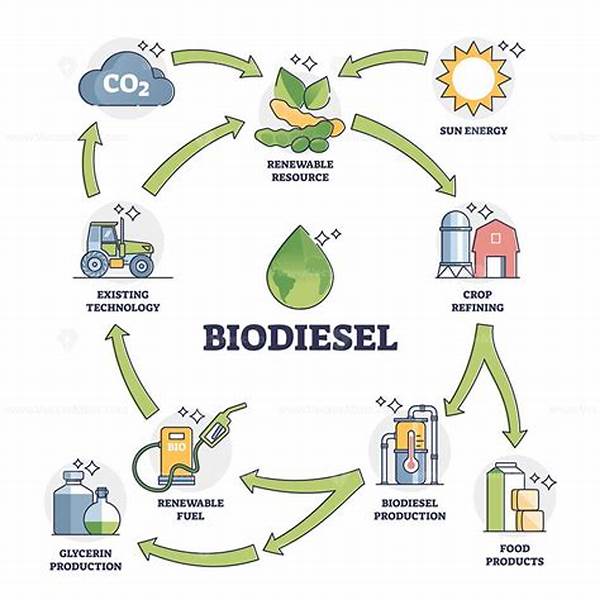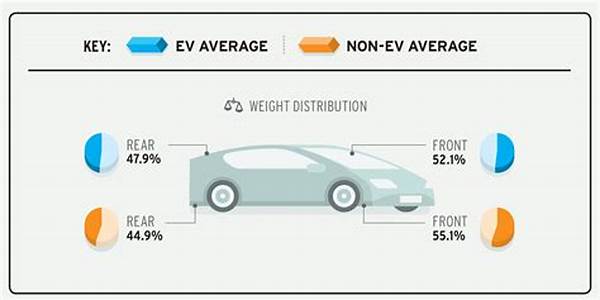Next-generation Biofuel Production Methods
The Evolution of Biofuel Technologies
The pursuit of sustainable energy sources has led to the innovation of next-generation biofuel production methods. As the world grapples with the pressing need to address climate change and reduce carbon emissions, biofuels have emerged as pivotal players in the renewable energy landscape. Traditional biofuel technologies, primarily relying on crops like corn and sugarcane, have been scrutinized for their impact on food supply and land use. Thus, researchers and industry leaders have sought innovative approaches to refine and revolutionize the production methods of biofuels.
Read Now : Understanding Hill Descent Control
Next-generation biofuel production methods focus on diverse feedstocks such as algae, waste biomass, and non-food crops, offering a more sustainable and efficient alternative. These methods aim to improve energy yields, minimize environmental impacts, and ensure economic viability. Breakthroughs in genetic engineering, biochemical conversion, and nanotechnology are shaping the landscape of biofuel production, thus providing cleaner and greener energy solutions. The integration of these cutting-edge technologies not only enhances the scalability of biofuel production but also addresses the limitations of first-generation biofuels.
In an effort to create a sustainable future, next-generation biofuel production methods are constantly evolving. Innovative technologies like synthetic biology and advanced fermentation processes are uncovering new possibilities in biofuel efficiency and efficacy. As these methods become more prominent, the global reliance on fossil fuels is expected to decrease significantly, promoting a cleaner environment. Consequently, the advancement of these biofuel technologies holds immense potential in transforming energy consumption patterns and supporting sustainable development goals.
Innovative Approaches to Biofuel Synthesis
1. Algae Power: Algae ain’t just for fish tanks anymore. It’s busting into the renewable scene big time. Next-generation biofuel production methods are using algae to make high-energy fuels without hogging farmland. Slick, right?
2. Waste Warriors: Turning trash into treasure, quite literally. Waste biomass is getting a new makeover with next-generation biofuel production methods, turning yesterday’s garbage into today’s energy solution. Total game-changer vibes!
3. Genetic Manipulation: No, it’s not sci-fi. Genetic tweaking is happening, and it’s all about creating super-efficient crops for biofuel. With next-generation biofuel production methods, science is making plants work smarter, not harder.
4. Microbe Masters: Microorganisms are getting their time to shine. Next-generation biofuel production methods tap into microbes to break down feedstock faster and better. Tiny powerhouses, doing big things!
5. Tech Fusion: It’s like a tech mash-up, blending nanotech and biofuel production for ultra-efficient energy creation. Next-generation biofuel production methods are going high-tech to boost every drop of fuel that’s produced.
The Future of Renewable Energy: A Slang Perspective
The green energy hustle is real, and next-generation biofuel production methods are leading the charge. You can think of it as Mother Nature’s new favorite playlist — forget about fossil fuels because the energy from biofuels is where the party’s at. We’re talkin’ slick algae setups, waste-to-energy trash transformations, and even microbes working overtime to bring us the goods. It’s all about keeping the planet chill while keeping the lights on. Forget the old-school, resource-draining ways; these fresh, eco-friendly vibes are stealing the limelight.
Now, this isn’t just some trend that’ll fade in a season or two. Next-generation biofuel production methods? They’re in it for the long haul. Think tech innovations coming through like pop stars, making biofuel production more efficient and way cooler. People are realizing that switching to these renewable energies actually means more green in the pocket and obviously, a tad more kindness to our planet. The revolution won’t be televised — it’ll be energizing the planet with a whole new groove. So, while everyone’s raising their eco-consciousness, next-generation biofuel production’s the bass drop we’ve been waiting for.
Disruptive Innovations in Biofuel Production
1. Algal Adaptation: Just picture your fave aquarium resident becoming a key player in sustainable fuel.
2. Trash-to-Treasure: Using yesterday’s scraps for today’s fuel lineup — that’s sustainability on a plate.
3. Genetic Groove: Bioengineered crops are setting new records for energy-rich harvests.
4. Microscopic Marvels: Tiny living powerhouses bringing big energy gains.
Read Now : Quattroporte Performance Specifications
5. Nano-magic: Blending disciplines to supercharge fuel production.
6. Crop Champs: New types of plants designed for minimal input and maximal output.
7. Biochemical Buzz: Breaking down barriers between potential and practicality.
8. Synthetic Swag: Using lab-grown resources to dodge nature’s constraints.
9. Scale Swagger: Tech not just about ideas, but making them reality at scale.
10. Climate Crusader: Methods championing the global fight against climate change.
Riding the Wave of Biofuel Advances
Get ready, ’cause next-generation biofuel production methods are turning up the heat on the energy scene. Let’s rewind and look at how algae is straight-up flexing as a biofuel boss. It’s making fuel more eco-friendly without hogging land that’s meant for food. Plus, with the latest tech and genetic tweaks, crops are running the biofuel race on overdrive. This isn’t just scientific mumbo-jumbo; it’s the real deal, making clean energy more accessible than ever.
Now take trash. Who’d have thought it’d take center stage? We’re talking yesterday’s leftovers being transformed into clean energy gold mines. With next-generation biofuel production methods, trash isn’t just out of sight, out of mind. It’s part of a new energy solution. These aren’t dreams or just some lab talk anymore — it’s happening live, making the planet greener by the tick-tock. The scene’s got this eclectic, forward-thinking vibe that’s just delivering one innovation after another.
Amidst this eco-revolution, it’s impossible not to mention the tech fusion playing out. Next-generation biofuel production methods are doing a killer collab between biotech and nanotech. The result? Unbelievably efficient energy outputs that are good for the wallet and the planet. The way it’s headed, today’s innovations are laying the groundwork for a cleaner, more sustainable tomorrow. This energy revolution? It’s not on pause; it’s at full throttle and doesn’t show signs of braking anytime soon.
Tech Trends in Biofuel Production
The world’s loving these new biofuel trends, and why wouldn’t they? They’re flashy, efficient, and super green. Next-generation biofuel production methods are using every trick in the book to push forward the energy frontier. Synthetic biology has some serious sway with lab-grown solutions that don’t depend on unpredictable weather or seasonal changes. It’s innovation at play.
And yes, the word on the street is all about energy efficiency. You’ve got biochemical processes working like a charm, ensuring that we get energy payback for every input. It’s kind of like squeezing all the juice from a tiny lemon. It’s this new era of energy that’s renegotiating our relationship with the planet and its resources. So, next-generation biofuel production methods? Consider them the real MVPs in the renewable energy league.



